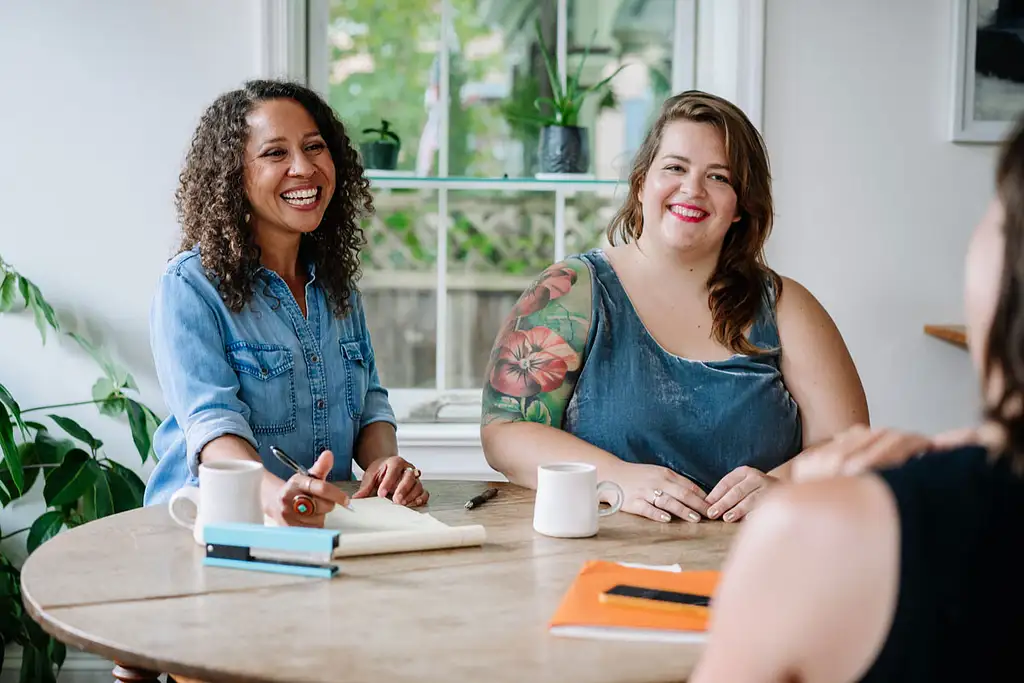Chordata is an investor in RUNWAY and in the process of investing in REAL People’s Fund, and has most recently been involved in co-investing in the small businesses that RUNWAY and REAL People’s Fund fund and support.
RUNWAY is a financial innovation firm committed to dismantling systemic barriers and reimagining financial policies and practices–all in the name of Black liberation. Their work helps build Black community wealth through early-stage funding, holistic business support and innovative financial products and partnerships.
REAL People’s Fund (Revolutionizing Our Economy for All People) is a democratically-governed & community-controlled loan fund that is leveling the playing field for entrepreneurs who have been blocked from opportunities to build wealth and are harmed by unjust economic systems. Through deep partnership, RPF partners with entrepreneurs to co-create an equitable and inclusive economy that celebrates their power, prosperity, joy, and liberation. RUNWAY is a key partner in underwriting and technical assistance for REAL People’s Fund.
Tiffany Brown and Nina Robinson sat down to discuss the co-evolution of Chordata, RUNWAY, and REAL People’s Fund, co-investment, and why this work is spirit work. Nina is the Fund Director at RUNWAY and has been a key thought partner and consultant as we’ve begun our co-investment journey.
Tiffany: Chordata is a deeply relational business, and as I think about this milestone of our 5 years, I’m like “Oh, my gosh, Nina, I’ve known you for 6 years!”. You were there from the very beginning of Chordata. The evolution of our personal relationship has been so connected to the evolution of the business.
Nina: Absolutely. Chordata and RUNWAY have been on a similar trajectory, having launched around the same time and we’ve been learning and experimenting together ever since. I feel like everything we’ve done, Chordata has been there. Our first fund RUNWAY did was a certificate of deposit program, and when we expanded it to Boston, Chordata was there. Then it evolved into the REAL People’s Fund, which is a deep partnership with community-led activists and organizations that are doing power building work in the East Bay. Chordata was one of our first commitments. When they do that, it conveys their trust & belief in us, and then other investors follow.
Tiffany: I want to talk about our relationships and how they started, because I love the story it tells about our co-evolution over time.
Nina: Yes, so Tiffany, Kate and I were all in this wild ride together of what is now called the Just Economy Institute fellowship, and there were a bunch of us who had ideas about how capital should be flowing. It was through that experience that Tiffany and Kate birthed Chordata, and it was around that time that the Runway team was forming and launching our pilot fund.
Tiffany: In the first fellowship gathering in October, you, me and Kate were in a small group together and we were all being like “man, what I’m doing right now, like my paid work is not it”. A few months later, our whole paths had completely changed. I think about starting from where we both were, with a curiosity of what the future holds and knowing that we needed to change, and your zest for figuring out what’s next. And then being here with you now.
And it’s been so fun with REAL People’s Fund! Especially recently with getting to practice co-investment, which is a thing that we’ve been really hungry to do. We’re seeing co-investment as a model, a template of how we’d like to move with other investors. We have such a trusting relationship with y’all that with co-investment, it feels like an honor to take this leap of faith and do it together.
Nina: Chordata is invested in RUNWAY and in REAL People’s Fund. They’re there all along the way, moving money to Black entrepreneurs in the early stages of a business. We call it “believe in you money”- that money that oftentimes you can’t get from a bank, but that people typically get from informal networks and family members. Because of the racial wealth gap, that type of money just doesn’t flow in the Black community like that. And so we created a way to move money like you would to a family member. We have a trust-based underwriting process that’s based on relationship. It doesn’t overly rely on credit scores and collateral and things that we know because of racist banking practices just really disqualify a lot of black entrepreneurs. Instead, we do a lot of hands-on really heart-centered business advising, trauma-informed, acknowledging that people come in with a lot of shit related to money and finances, and that starting a business is really hard and stressful. We have this relationship where we’re providing the entrepreneurs the emotional support, but also the technical skills through our partnership with Uptima, to develop their business plan, their financials, all of that.
And, what we were seeing is a lot of times these businesses need to raise more money than REAL People’s Fund is able to offer. We’re trying to get them funding from all the different CDFI’s out there, but there is often a gap on top of that where they need non-extractive growth capital. Let’s say they need a million dollars to expand their business, hire, and buy equipment, and they’ve raised maybe half of that through the existing community finance players. Well, where are they going to get that gap from?
Chordata is basically coming in as angel investors, but in what should be the true definition of the word angel investor. Like true guardian angels that are swooping in and taking a chance and leaning on relationships. Angel investment is usually family members or colleagues or alumni networks or people that are saying, “Hey, I believe in your idea. I believe you can do this, and I’m gonna put in money in that early stage when no one else is willing to do it.”
Typically, if someone wants to get this type of capital, they have to give up a lot to get it. They’re gonna have these really extractive terms. And so REAL People’s Fund developed really innovative terms. So I think Chordata is a network of folks that are really leaning on the relationship, that really trust that RUNWAY and Uptima are providing the advising and acting as a risk mitigant. They’re trusting that we’re doing the heavy lifting of due diligence, and that we’re able to share what’s happening and keep it real about what’s hard, and what are the successes.
And by the way, these are businesses that are just doing really phenomenal things. I think about Reem’s, one of the businesses that we are working on co-investing in. It’s an Arab style bakery and the founder Reem is a former activist. She wanted to create a bakery that was also a community space. Over the evolution she decided that she wants to convert the business into a cooperative model and share the ownership with workers. And you know that’s not a decision that you can make lightly. She has developed this really robust training program where everyone in the company is getting trained on everything from business skills, financial skills, leadership, decision making- all the things that someone might need to know to decide if they want to be a business owner or a cooperative member. And she’s doing this alongside touring the country with her beautiful cookbook & baking bread!
So many of the businesses that we work with are healing communities, straight up. They’re in business, but they’re also creating all this amazing impact without making a big to-do about it- they’re just doing it because it’s the right thing to do.

Tiffany: One thing that came to mind as you were talking, Nina, was how co-investing and investing in individual companies was until recently a totally new thing for us at Chordata. We had traditionally invested in funds where the risk was diversified, a portfolio of many different companies instead of just one company. Before this co-investment with REAL People’s Fund, we had a little bit of experience of investing in individual companies, but we realized we were bringing a lot of fear and insecurity with learning a new thing. But then we took it back to “what are the guiding principles of our business”, and invited in greater transparency with our clients, so that we were like, “Hey, y’all, this is an absolute need and would you be willing to take an outsized risk?” We were able to offer framing that identifies the mechanics of how capitalism has fucked over Black people, and this beautiful opportunity to come in alongside a trusted partner, and also naming all the different places that we’re mitigating risk. But it’s still scary to support our clients in taking big risks and also we’re also really clear about the value of taking those risks.
It’s beautiful to be in the evolution of what it means for our businesses to continue to level up together. And we’re bringing our clients into the mechanics of how we question the way that capitalism has worked, and how we’re going to support Black and brown folks to get ahead. That feels really exciting.
Nina: It’s also unlocked a lot for us at RUNWAY. We’ve always felt like the whole pitch space can feel really yucky and extractive for people. We did a webinar together with Chordata’s clients that was so beautiful, and I was like, “yes, this is what it has to feel like if we’re gonna do this work”, you know. As RUNWAY gets ready to launch our National Fund and is thinking about supporting entrepreneurs around the country, my imagination around what is possible is really based on what we’ve done together, on how we move non-extractive capital in ways that aren’t like shark tank. Like, what’s the non-extractive shark tank co-investment?
Tiffany: With REAL People’s Fund and RUNWAY, it feels like it’s the beginning. I’m thinking about Kate’s recent trip to the South with the RUNWAY delegation. We’re really clear that a lot of our work feels like spirit work, both for the healing of our ancestral lines like me and Kate together, as well as going and doing that trip to the South myself with RUNWAY, that felt like spirit, ancestral work. There’s this way to rise to the occasion of something that feels kind of terrifying, like skilling up on investing in individual companies, and knowing I can’t turn back. There’s too much on the line to make our own fear central when we’re talking about trying to heal and bridge the racial wealth gap.
Nina: Yeah, absolutely. And the other thing that you’re reminding me of is how Chordata has set the standard and has made it so that we’re able to illustrate what right relationship looks like, especially when you have a dynamic between white wealth holders and moving money to BIPOC communities. How joyful it could be when people are doing their work and when they show up in that way. You all have primed your folks, and we’ve had the opportunity to come and sit and vibe, and meet the cohorts and connect on a human level. And it’s just made the work so beautiful. Because it is healing work, it absolutely is. We’re just undoing so much of the pain, we’re acknowledging so much that has led to these racial wealth gap statistics that we talk about, and our lived experiences inside them. So yeah, I think that’s absolutely right, Tiffany. It does feel like really, really, really special and magical work.


